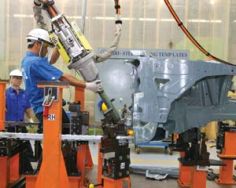


| Hotline: +84 (0) 937 099 599 |
|

In late 2008, some foreign investors registered their investment projects to be able to enjoy the investment incentives stipulated by the laws at this moment. However, the investors then kept the projects pending for two years, 2009 and 2010. They only returned in 2011 and asked for the investment incentives the local authorities promised two years ago.
“Should the investors be given the promised investment incentives?” questioned Pham Thai Son, Head of the Board of Management of Industrial Zones in Hung Yen province.
Son’s question shows that Vietnamese agencies get puzzled with the policies on investment incentives. For a long time, Vietnam has been applying a policy on providing incentives equally to all investors. However, Son believes that the policy should be stopped.
“The above said investors should not be given investment incentives, because they did not follow their investment commitments, suspending the projects for two years,” Son said.
Economists have repeatedly voiced their disagreement with the currently applied investment incentive policies. The Ministry of Planning and Investment, in the draft plan on reviewing the FDI situation, has admitted that the incentives have been given in a large scale with too many subjects enjoyable.
Do Nhat Hoang, Head of the Foreign Investment Agency, has pointed out that with the current fixed tax incentives, a one billion dollar project would be able to enjoy the same preferences as a one million dollar project. Hoang believes that this is unfair investment encouragement policy.
Ngo Sy Bich, Head of the Board of Management of Industrial Zones in Bac Ninh province, said he was too tired of moving heaven and earth to ask for the investment incentives for the two big projects in the province, namely Samsung and Nokia.
Samsung has been cited as a typical example showing the problems in the current investment encouragement policy. Despite the huge investment capital and effective operation, under the current laws, the investor still cannot enjoy incentives for the expanded project with the investment capital increasing from 670 million dollars to 1.5 billion dollars.
Samsung is now still awaiting the nod from the government to its proposal to enjoy a specific incentive mechanism for the project.
Regarding Nokia case, Bich said it took the board of management three months to get the nod from the government to allow Nokia to enjoy tax incentives as a high-technology enterprise.
Bich once asked senior officials of the Ministry of Science and Technology if there has been any project meeting the requirements to be recognized as high-technology enterprise in accordance with the High Technology Law, and received the answer “no”.
Bich said he could not imagine that a law is built so that no enterprise can satisfy its requirements.
The investment incentive policies were expected to attract foreign investors to high-tech fields and some important fields. However, Vietnam has failed to obtain that goal with the policies.
Hoang of MPI believes that it is necessary not only to set up a standard incentive mechanism, but also apply flexible incentives for some specific cases. He said that equal incentives should not be offered to all investors, while incentives should be headed for targeted investors only.
Thai Ba Canh, Deputy Head of the Board of Management of Industrial Zones in Da Nang City, also thinks that Vietnam should accept to conduct negotiations in order to attract huge projects, provided that it sets up concrete requirements on investors. 8 biggest real estate M&A deals in 2013
8 biggest real estate M&A deals in 2013
 What businesses can and can't do when cutting jobs
What businesses can and can't do when cutting jobs
 Japanese pharma invests nearly $100 million in Vietnamese medicine maker
Japanese pharma invests nearly $100 million in Vietnamese medicine maker
 New regulations for labour subleasing
New regulations for labour subleasing
 Ten Tips for Making Solid Business Agreements and Contracts
Ten Tips for Making Solid Business Agreements and Contracts